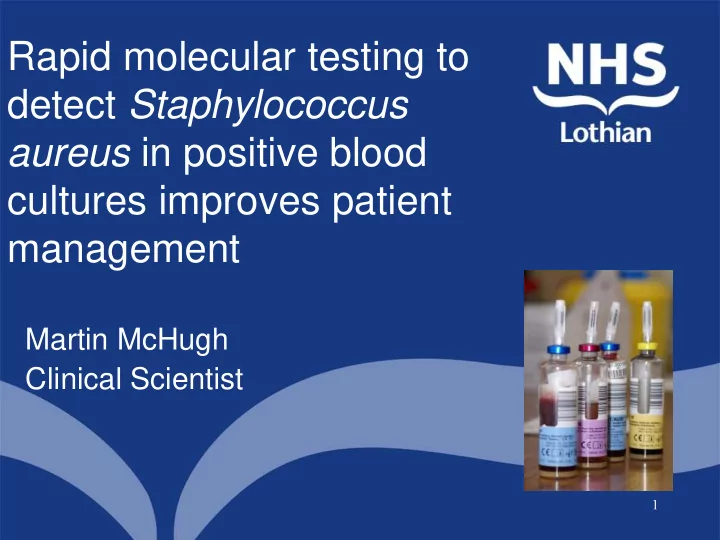

Rapid molecular testing to detect Staphylococcus aureus in positive blood cultures improves patient management Martin McHugh Clinical Scientist 1
Staphylococcal Bacteraemia • SAB is an important burden on healthcare (31 per 100,000 AOBDs 2013-14), 1 reflected in HEAT targets • Proportion due to MRSA is decreasing but MSSA remains a problem • Delay in appropriate antibiotics associated with worse outcomes 2 – Start empiric therapy and rationalise when culture results available • Most blood cultures with GPCC on Gram are CoNS – Often contaminants not requiring Abx 1 HPS (2014) Scottish S. aureus bacteraemia surveillance report 2 2 van Hal et al (2012) Clin Microbiol Rev
Xpert MRSA/SA BC Assay • Automated DNA extraction and real-time PCR • Detects S. aureus ( spa ) and methicillin resistance (SCC mec and mecA ) in positive blood culture fluid • Internal controls to verify assay efficiency • Around 10 min hands-on time and 62 min on machine • Kit Insert – 58 MRSA, 120 MSSA, 268 non-SA samples • MRSA 98.3% sensitive, 99.4% specific • MSSA 100% sensitive, 98.6% specific – Lots of studies agree with these figures 3
Sample collected, Loaded onto BacT Alert Gram film, media put up – sent to lab Morphology 18-24 h ~70 Latex, MALDI, MRSA selective agar – min ID and presumptive MRSA/MSSA Xpert assay – MRSA/MSSA ≥ 24 h Full sensitivities – Final report 4
Study Aims 1. Determine the accuracy of rapid molecular testing for MRSA/MSSA in positive blood cultures with GPCC 2. Compare turn around time (TAT) with standard methods 3. Does this strategy alter patient management? 5
Inclusion/Exclusion Criteria • Submitted to lab medicine Quality Improvement Team as a service evaluation – Recruitment 22/12/14 – 30/01/15 • Inclusion Criteria – Positive blood culture with Gram positive cocci in clusters • Exclusion criteria – Mixed organisms on Gram film – Charcoal-containing blood culture bottle – Blood culture positive over the weekend – Patient tested in previous 2 weeks (unless requested by 6 clinician)
Lab Processing • Bottle flags positive, Gram by BMS • If eligible, take 500 μ l bottle fluid • (Centrifuge 3,000 rpm for 2 min) • 50 μ L added to 2 mL elution reagent • Vortex and add whole volume to cartridge • Load on GeneXpert • Result manually added to APEX record and passed to duty medic 7
Accuracy of Rapid Molecular Testing Result Test MRSA MSSA S. aureus not Invalid detected Culture 1 9 71 - Xpert 1 9 64 7 • 80 samples from 79 patients • 100% sensitive & specific for MRSA/MSSA • Performance comparable to literature 8
Lab Turn Around Time • Time from flagged to Apex result entry Median: 1.3 h 3.1 h 24.7 h 48.7 h 9
Clinical Utility • PCR result ~21 h earlier than culture • From 54 instances with data, management was improved based on PCR result in 16 (30 %) cases • Although management unchanged in 38 cases, medics felt more confident having the PCR result • Rapid results reduced medical report time Management Antibiotic Antibiotics Antibiotics Antibiotics No data Total not changed s Started avoided changed stopped 26 a 38 8 5 2 1 80 a Not available: data not recorded (17), Xpert failed (7), patient deceased (2) 10
Financial Implications • Routine blood culture = £15 • Xpert test = £32 • Need to balance lab costs with potential savings in other areas – Reduce unnecessary antibiotic use • Less side effects, C.diff, resistance? – Better management of SABs • Improve patient outcomes, inpatient stay, transmission? 11
Conclusions • Xpert MRSA/SA BC Assay performed well and was simple to do • Could rationalise management ~21 h earlier – This was done in 30% of cases • PCR improved patient and time management – Potential for positive knock-on effects out with lab medicine should be studied further 12
Acknowledgements • • Fiona MacKenzie • Kate Ben Templeton • Service Evaluation of Parcell • Lab staff Rapid Molecular • Diagnostics Group Clinical Staff 13
Questions? 14
Recommend
More recommend